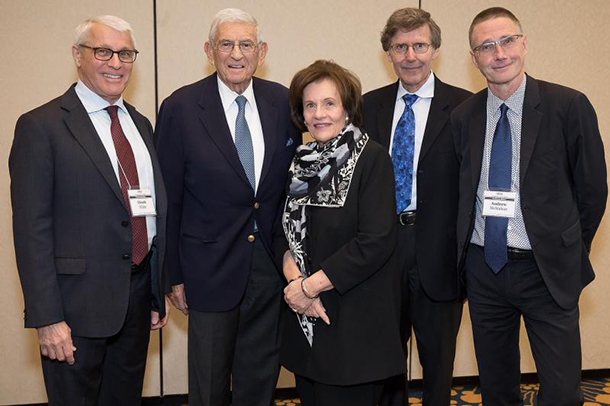Scientists from USC, UCLA and UCSF gathered at a symposium recently to celebrate the 10th anniversary of their three stem cell research centers, established with support from Eli and Edythe Broad and the California Institute for Regenerative Medicine (CIRM). As the guests of honor, the Broads marked the milestone by surprising the centers with a $1 million gift to support eight grants for early-stage stem cell research projects.
“We love scientists because none of you are satisfied with the status quo,” Eli Broad said at the Feb. 4 symposium, hosted by UCLA.
In addition to recognizing the Broads, the symposium highlighted recent scientific progress.
UCLA’s Donald Kohn, MD, described how stem cell research has already cured infants born without a functional immune system — an inherited condition called adenosine deaminase severe combined immunodeficiency, or “Bubble Baby Disease.”
Arnold Kriegstein, MD, PhD, director of UCSF’s stem cell research center, shared how his research spurred an ongoing clinical trial, using the antibiotic azithromycin to treat Zika patients in Brazil.
UCSF’s Holger Willenbring, MD, PhD, is nearing the clinical trial stage with a stem cell-based approach to treating liver cirrhosis.
Other scientists shared earlier-stage discoveries.
Andy McMahon, PhD, director of the stem cell research center at the Keck School of Medicine of USC, has focused his lab’s full efforts on generating a human nephron, the functional unit of the kidney. To better understand how a human nephron develops, his lab is studying organoids, 3-D assemblies of cells possessing rudimentary kidney structure and function.
Neil Segil, PhD, professor of research stem cell and regenerative medicine at the Keck School, addressed hearing loss due to damage to the inner ear’s sensory cells, which do not regenerate in humans. However, they do regenerate in non-mammals, such as birds. Segil’s group is exploring ways to stimulate a similar regenerative response in mammals.
Min Yu, MD, PhD, assistant professor of stem cell and regenerative medicine at the Keck School, addressed metastasis, the leading cause of cancer-related death. By analyzing patient-derived breast cancer stem cells, her lab found that certain mutations and gene activity can consistently predict specific patterns of metastasis — such as the formation of secondary tumors in the brain versus other organs.
Other speakers included: UCSF’s Saul Villeda, PhD; UCLA’s Amander Clark, PhD; and Owen Witte, MD, director of UCLA’s stem cell research center.
“We cannot express how much your work means to us,” Eli Broad said, “and how we appreciate all you do to improve human health.”
— Cristy Lytal


